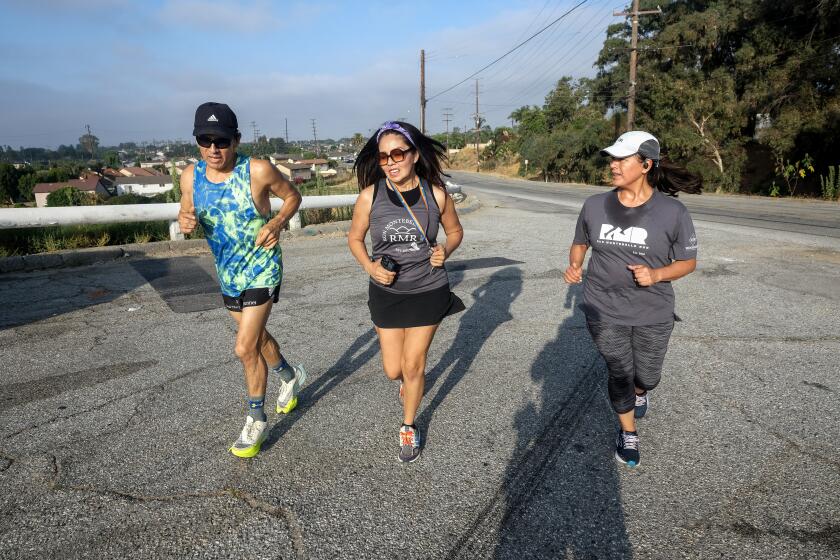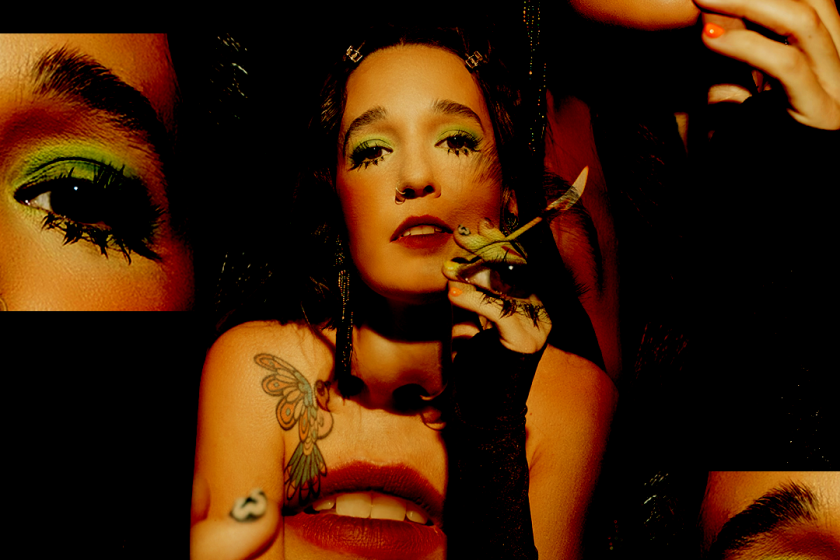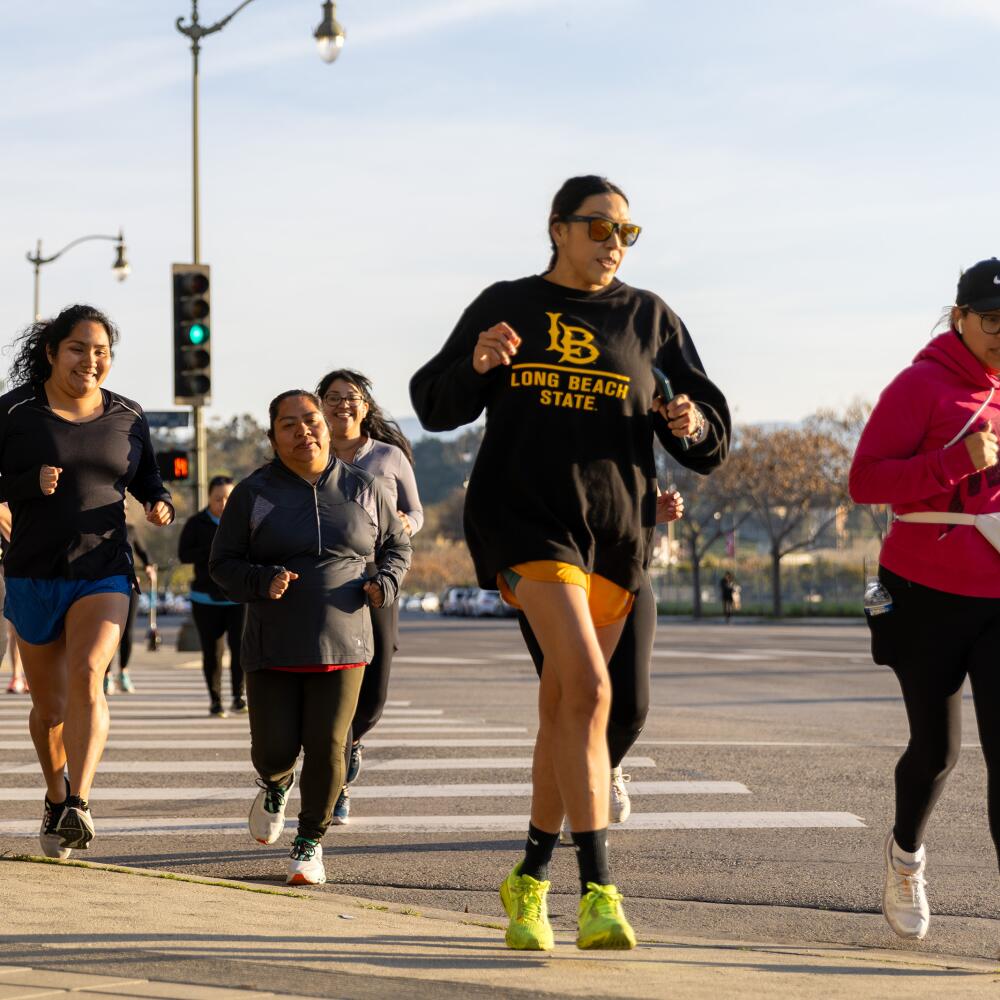
- Share via
On a rainy Saturday morning in early March, a group of 60 women huddled outside Blue Ribbon Sports in Santa Monica in preparation for the Los Angeles Marathon. The conditions weren’t ideal, but that wouldn’t stop the Running Mamis from gathering at 6:30 for their last full-fledged training before the big race.
Raquel Román and Jo Anna Mixpe Ley arrived early to set up the black and white nylon Running Mamis flag on the exterior of the shoe store. They review routes while hugging spandex-clad runners as if they were at a family function. What started in Boyle Heights in 2018 as a safe space for mothers to run with their babies in tow without the threat of catcalls and cracked sidewalks has become an ever-growing community.
These 4 Latino run clubs across Southeast and East Los Angeles could help you accomplish your 2024 fitness goals.
Román and Ley founded Running Mamis with Raquel Zamora and Monica Perez shortly after becoming first-time mothers, an idea sparked while participating in a community run with their babies in strollers. Frustrated with the lack of “mommy and me” spaces and safe running paths on the Eastside, the quartet decided to start their own running group. Their first meetup, held at the Los Angeles State Historic Park, drew 10 runners.
“This space is a saving grace,” said Ley, 47, who picked up running in college.
“It’s become our lifeline through the pandemic and personal challenges. We see each other and hold each other without judgment. We talk about childbirth, postpartum depression, challenges we’re having with our partner or at work. Doing that while moving helps you process and move forward. It’s liberating. We’re so lucky our kids see it as a norm.”
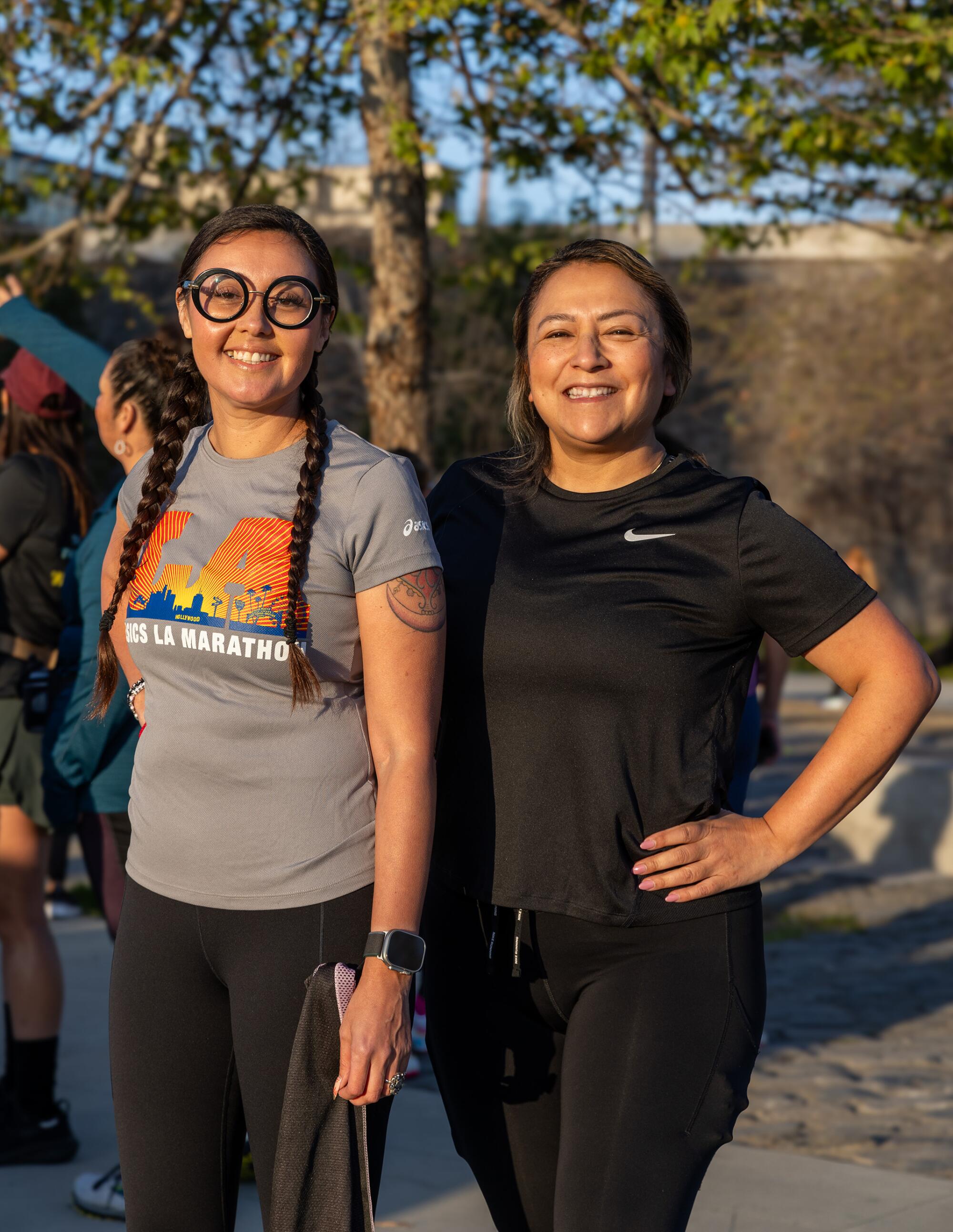
Since then, the Running Mamis have grown to about 70 members and are now an official Nike L.A. running club. Identifying mostly as Chicana and Latinx, the Mamis are intergenerational, ranging from 18 to 66 years old. Grandmothers, nieces, tias, friends and co-workers get in on the action. It’s an inclusive space where all distances, levels and paces are welcome.
“A lot of time at races you look around and there’s not a lot of women of color,” said Román, 43, who lives in Huntington Park. “These women are going to the races with different body types, diverse body shapes and they’re all at the start line. That’s what I’m really proud of.”
You’re reading Latinx Files
Fidel Martinez delves into the latest stories that capture the multitudes within the American Latinx community.
You may occasionally receive promotional content from the Los Angeles Times.
Many of the Running Mamis live in Boyle Heights and southeast L.A. County, but some travel from as far as Ventura and San Diego for twice-a-month meetups at L.A. State Historic Park, Griffith Park and the Rose Bowl. During training season, they meet weekly. They are stay-at-home moms, educators, organizers, lawyers, artists, chefs, therapists, social workers and restaurant workers. Some run one mile, others run 20.
The Running Mamis are a tight-knit group that prioritizes community over competition. They trick or treat with their kids on Halloween, run through the streets of East L.A. during Latinx History Month and take yoga and self-defense classes for Mother’s Day. Some of the kids who were in strollers when Running Mamis began are now grown and participate in local kid runs. Román and Ley sometimes invite professional trainers and running coaches to teach the runners about form, nutrition and how to run according to their menstrual cycle. Mamis are reminded to trim toenails and ensure shoes fit properly — a thumb’s width of space between the big toe and the front of the shoe.
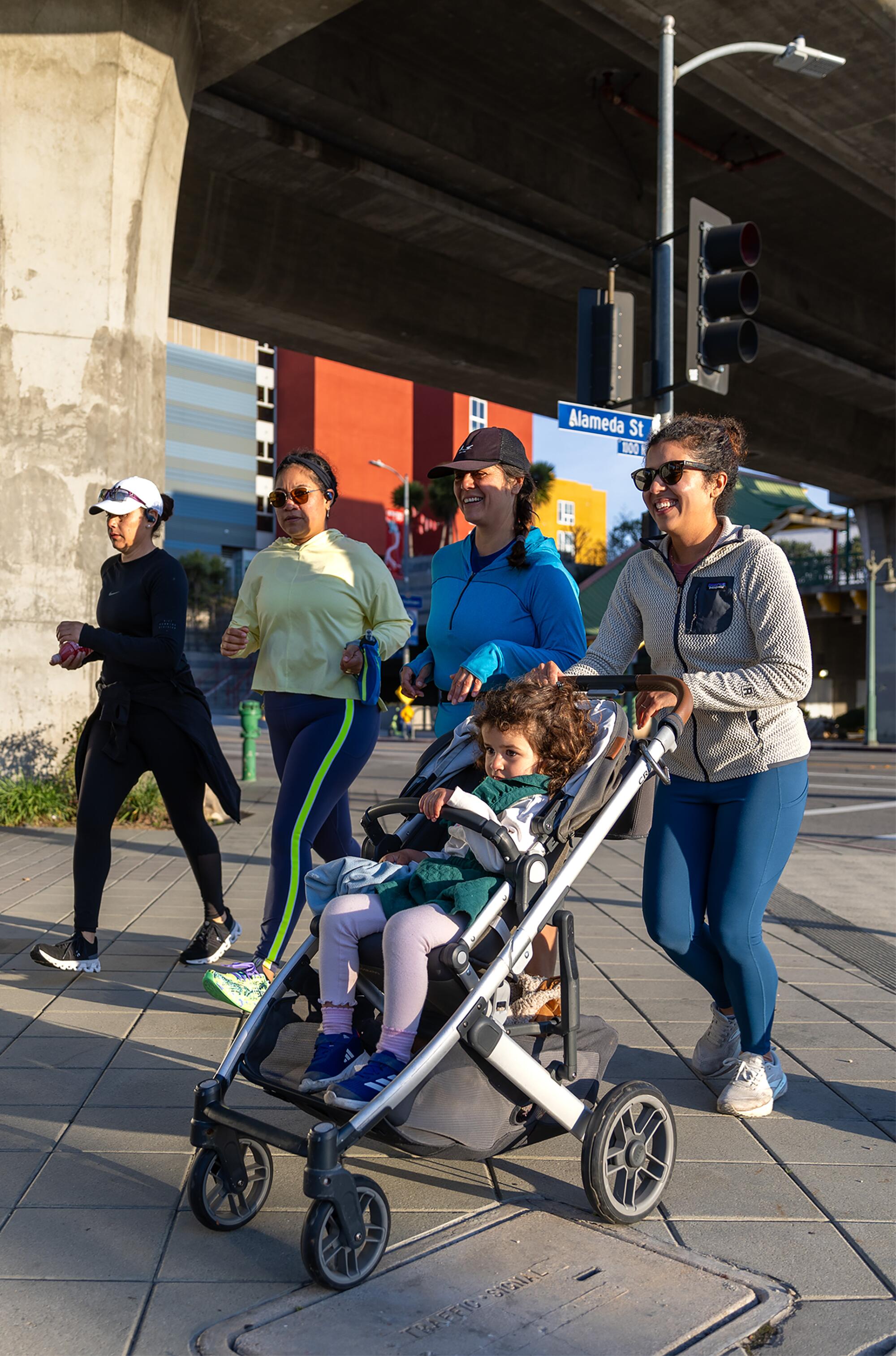
Before each run, the Running Mamis circle up to check in and set their running intention. Two or three miles are typical — when training for a marathon, runs can get as long as 20 miles. The real talking starts when the running begins. Friendships are born on these trails.
The Running Mamis provide Latinx mothers an opportunity to come together and share stories about the struggles of motherhood. Postpartum depression affects Latinas at higher rates than white women, according to a study published last year by the American Journal of Obstetrics and Gynecology.
“Mothers risk losing themselves because of how much they give and how little time they have for themselves,” said Adriana T. Alvarez, a psychotherapist based in L.A. “Running lifts moods and keeps moms fit to meet the physical endurance required of motherhood. The meditative focus on breath keeps moms present. It sends kids the message that mothers are strong, we take care of ourselves and our separate time is a priority.”
A 2023 study by Adidas found that 92% of women are concerned for their safety when they run alone, with half of them afraid of being physically attacked. More than a third of women said they experienced physical or verbal harassment, including sexist comments and being followed.
Although crime statistics indicate these types of attacks are rare, women are hypervigilant when they run. Just last month, a Georgia nursing student was killed while jogging on campus. There are at least nine known cases in the last 10 years of women who were fatally attacked by strangers while running.
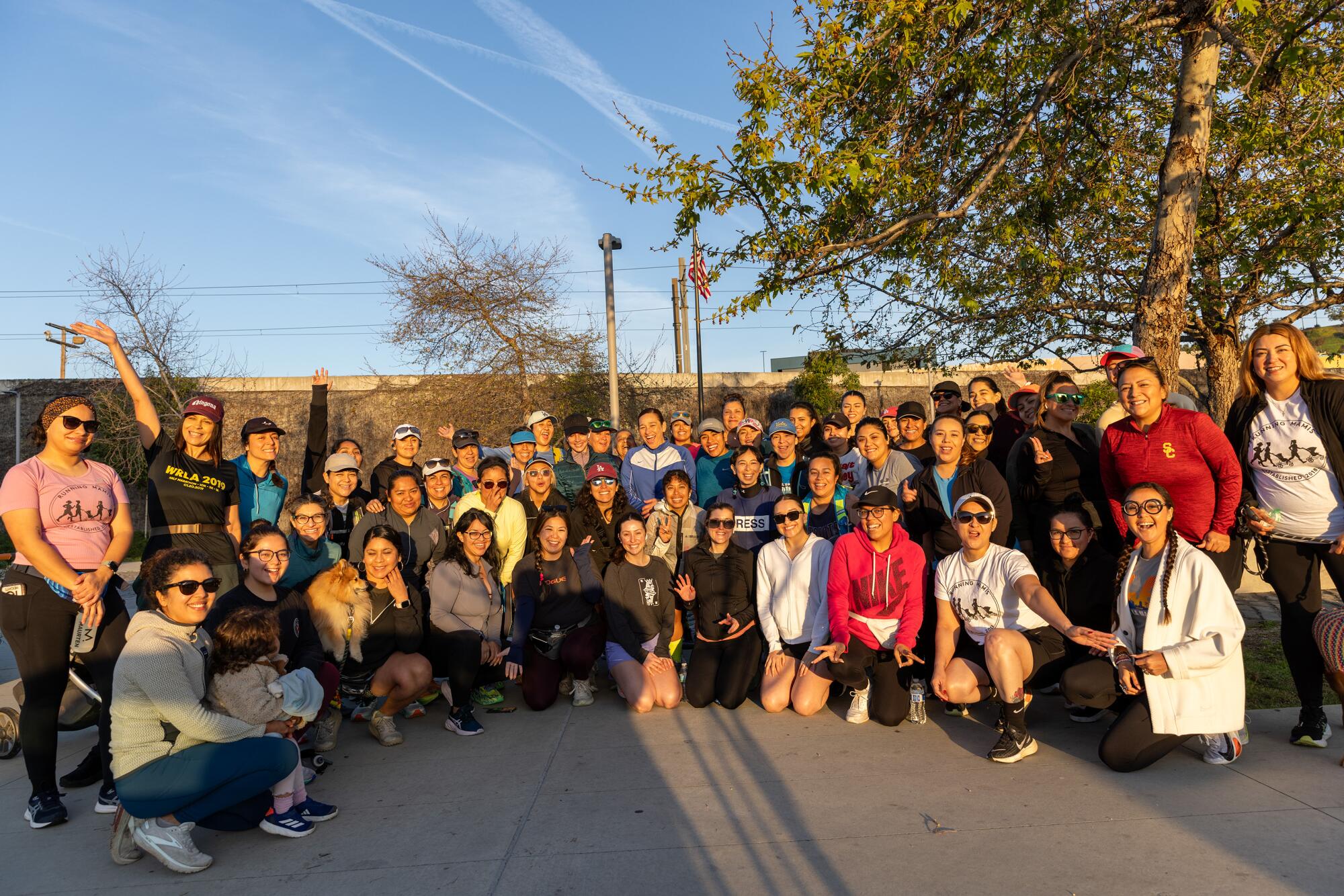
“Running with the Mamis gives me a sense of security,” said Laura Lara, who lives in Bell Gardens. She started carrying pepper spray when she runs along the Rio Hondo bike path after a woman was attacked in the area. She’s been followed by men in cars and pedestrians while running.
An avid marathon runner, Lara said running quiets her mind and helps her work through life’s difficulties. On a mission to keep running after she got pregnant, Lara heard about Running Mamis through a friend, but social anxiety kept her from joining. Tired of training for the marathon by herself, she met up with them for the first time in 2022. Running with a group, she discovered, increases her stamina and gives her the motivation she needs to keep running. Having someone in front and behind her makes running long distances easier.
“Running in community is so encouraging,” said Reina Rodriguez, who teaches Chicano and women’s studies at Cal State L.A. and has a 9-year-old son. She lives in Azusa and gets up at 5 a.m. to run with the Mamis.
“It’s a sacrifice to get up early on a Saturday, but I do it because it’s so much fun,” she said. “Everyone is so supportive and waits for everyone to finish. I’m not doing it for a specific time or pace. I’m doing it for the experience.”
Curiel is a fourth-generation Xicana born in East L.A. and raised in Monterey Park and South San Gabriel. She’s written for L.A. Taco, Latina magazine, LAist, KCET, Alta and the Huffington Post, and was the senior editor at Remezcla and Sí TV.
More to Read
The Latinx experience chronicled
Get the Latinx Files newsletter for stories that capture the multitudes within our communities.
You may occasionally receive promotional content from the Los Angeles Times.
